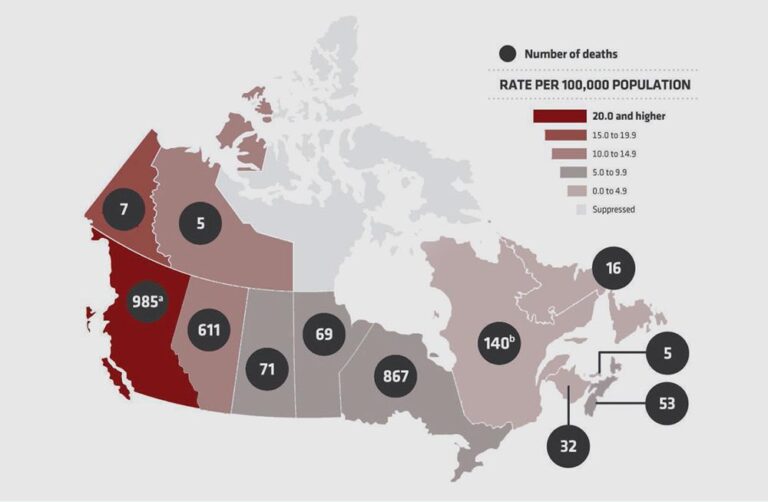title: Rethinking CanadaŌĆÖs Opioid Crisis: A New Perspective
As Canada grapples with the ongoing opioid epidemic, the dialog surrounding this pressing issue is undergoing a meaningful transformation. Initially viewed mainly as a public health dilemma, discussions are now expanding to encompass wider social determinants such as economic inequality, mental health struggles, and systemic healthcare shortcomings. This shift highlights an increasing awareness that the crisis transcends urban areas and marginalized groups,impacting individuals from diverse backgrounds. Recently, advocacy organizations, healthcare professionals, and families affected by addiction have intensified their calls for a more holistic response that incorporates harm reduction methods, improved access to treatment options, and necessary policy reforms. In this article, we explore recent developments in Canada’s opioid crisis narrative and how these evolving perspectives may influence future actions.
Transforming Public Perception on Opioid treatment in Canada
The discourse around opioid treatment strategies in Canada has experienced a pivotal change over the last twenty years. Once characterized by punitive measures against addiction and an emphasis on reducing supply chains of drugs, conversations are now leaning towards understanding addiction as a multifaceted health concern. There is growing public acknowledgment of the necessity for thorough approaches that incorporate harm reduction, education, and accessible treatment. Canadians increasingly recognize that dismantling stigma associated with opioid use is vital for creating an environment were individuals feel secure in seeking assistance.
A key driver of this evolving perspective is the recognition of effective interventions such as safe consumption sites, opioid agonist therapy, and various community-driven initiatives aimed at mitigating the crisis. Research indicates these harm-reduction strategies lead to lower overdose rates while enhancing access to healthcare services for those battling addiction issues. As policymakers and communities begin adopting these approaches more widely,public acceptance appears to be risingŌĆöshifting recovery from being seen as unattainable or shameful into something achievable deserving support.
Understanding Fundamental Causes of Addiction: Beyond Traditional Methods
The dialogue surrounding addictionŌĆöespecially within the context of opioidsŌĆöis gradually transitioning towards a more comprehensive approach focused on identifying underlying causes rather than merely addressing symptoms. Conventional methods frequently enough centered around abstinence or criminalization are increasingly viewed as inadequate solutions.Experts advocate for strategies that examine socio-economic factors contributing to addiction such as mental health challenges, poverty levels,and trauma experiences.
Tackling these root issues not only facilitates recovery but also aids in preventing future addictionsŌĆöeffectively transforming lives instead of just managing crises related to substance use.
Pioneering programs across Canada exemplify this shift by integrating community resources into treatment frameworks tailored toward individual needs. These initiatives prioritize providing essential support thru avenues like education opportunities,employment assistance,and mental wellness services; recognizing that addiction frequently stems from deeper unresolved challenges.
some notable components emerging within these innovative strategies include:
- peer Support Initiatives: Engaging individuals who have navigated similar struggles to offer guidance and encouragement.
- Holistic Approaches: Incorporating practices like mindfulness meditation,yoga sessions,and creative therapies aimed at enhancing emotional well-being.
Towards Holistic Solutions: Policy Suggestions for a Health-Focused Approach
A prosperous response to Canada’s ongoing opioid crisis necessitates embracing a health-centered framework encompassing diverse strategies targeting prevention,harm reduction,and effective treatments.Central elements required include:
- Increased Financial Investment: Allocating substantial funding toward mental health services alongside comprehensive drug rehabilitation programs.
- Enhanced Awareness Campaigns: Launching extensive educational efforts directed at both general populations along with medical professionals regarding risks linked with opioid misuse alongside available resources.
- Legislative Reforms: advocating decriminalization policies concerning small quantities possession encourages individuals seeking help without fear stigma attached.
Moreover,cross-sector collaboration involving healthcare providers,law enforcement agencies,and social service organizations can establish robust networks supporting those affected by substance abuse issues.Key recommendations include:
| Recommendation | Anticipated Outcome |
|---|---|
| Expand Access Safe Consumption Sites | (Expected) Decrease Overdose Death Rates Improve Overall Public Health Safety |
| (Integrate Services Mental Health Substance Use) </ td | (Provide Comprehensive Support Reduce Gaps Treatment) |
| (Increase Availability Naloxone) | (Enable Rapid Response Overdoses Save Lives) |
<h2 id= "conclusion" Concluding Thoughts
As Canada confronts its persistent struggle against opioids,the conversation surrounding this critical public health emergency continues evolving.Stakeholders ranging from government representatives through grassroots advocates acknowledge solutions require far beyond punitive actions; they demand integrated approaches incorporating harm reduction tactics,easy access treatments along robust supportive infrastructures.as dialogues progress,it remains imperative policymakers prioritize empathy coupled evidence-based methodologies mitigate devastating impacts opioids inflict upon communities nationwide.The transformation occurring within discourse presents opportunities not only address immediate challenges posed but also pave pathways healthier,resilient societies moving forward.The urgency demands sustained focus action quest effective remedies persistsŌĆöthe stakes remain high,time enact meaningful changes has arrived.




